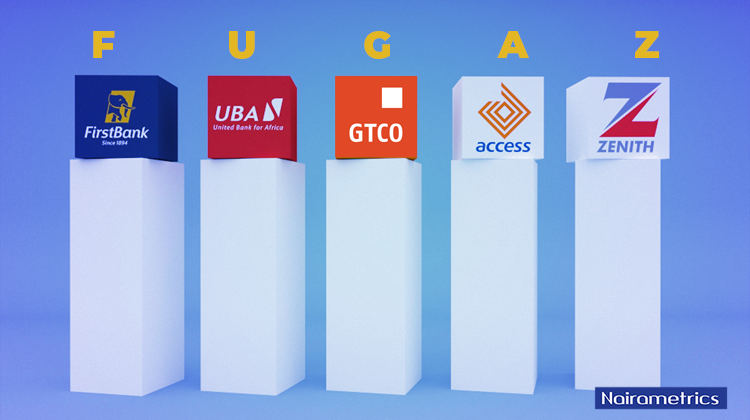This time last year, Zenith Bank and GTB were far from joining the prestigious trillion market capitalization club of companies, otherwise referred to as SWOOT by Nairametrics.
Before this, only six publicly listed companies on the exchange had a market valuation above one trillion. These were Dangote Cement, Airtel, MTN, BUA Foods, BUA Cement, and Nestle.
Nigerian banks have historically traded at meager earnings multiples for the better part of the last decade. GTB led the pack with a price-earnings multiple of just 6x at best, despite posting year-on-year increases in profits. Zenith traded at multiples of 3x, and the rest of the FUGAZ at multiples of 2x, all representing some of the most undervalued equities in the market.
Then came multiple headwinds that, as one would expect, should have been a deterrent for investments. This included cash scarcity, the 2023 elections, exchange rate depreciation, and high inflation, to name a few. It seemed like it all came crashing down. But the banking bulls had other ideas.
Zenith first hit the trillion naira market cap, and soon GTB followed. By mid-year, when the first set of banking sector results started coming in, investors already had an idea of what to expect.
Profit growth soared to levels not seen in the history of Nigerian banking. This sent an already depressed banking sector price-to-earnings ratio even lower, drawing the rapt attention of investors. In dollar terms, Nigerian banks became even cheaper, spiking demand for their shares.
This set the tone for Zenith and GTB to catapult to a trillion-market capitalization by mid-2023. Since then, UBA, First Bank, and Access Bank have joined the trillion-market cap bandwagon, with the trio joining in January 2024. While this trajectory was expected, the pace at which First Bank, Access Bank, and UBA joined the fold smacks of infection.
All three joined the SWOOT within days of each other this year, only 16 days on, pushing the FUGAZ market capitalization by N3.2 trillion to N6.1 trillion in a matter of weeks.
Nairametrics estimates their combined price-to-earnings multiples at 3.2x, still very low when compared to other FUGAZ stocks. For example, GTB still trades at 3.29x, while UBA, which just joined the SWOOT gang, trades at 3.77x. Zenith Bank, the most capitalized SWOOT, even trades at a lowly 2.98x.
Despite these appreciable valuations, headwinds remain for FUGAZ and the banking sector in general. The central bank has signalled a tighter regulatory environment that promises to do away with some of the lapses that prevailed under the Godwin Emefiele-led apex bank.
The current Governor, Yemi Cardoso, has stated the intention of the banking regulator to increase banking sector capitalization. Banks also still carry significant non-performing loans despite provisioning N669.5 billion in the first nine months of 2023 and not breaking the NPL ratios.
However, the infectious growth in the market share of the banks is not restricted to banks alone. The NGX All Share Index is already up 17.7% in the first two weeks of the year as stocks continue to fire on all cylinders. The growth is also largely influenced by the banking sector considering its liquidity and deal size.
The remarkable ascent of Zenith, GTB, UBA, First Bank, and Access Bank into the trillion naira market capitalization club epitomizes the ‘Buga’ spirit a term in Nigeria denoting a boisterous display of success, akin to raising one’s shoulders in pride.
This infectious energy has not only transformed the landscape of the Nigerian banking sector but has also reverberated through the entire Nigerian Stock Exchange.
As these banks continue to post impressive growth and defy the odds amid economic headwinds, they indeed embody the essence of ‘Buga’ showcasing resilience, confidence, and an unwavering commitment to excellence in the Nigerian financial market.
However, it’s important to remember that in the ever-fluctuating world of finance, a shoulder raised in triumph is also bound to be lowered in time.
This calls for caution amidst the frenzy, reminding investors and stakeholders alike to remain vigilant and prudent, even in times of extraordinary success.
Disclaimer: The author(s) of this article may hold shares in, or have buying and selling intentions for, any or all of the stocks mentioned in this article. This article should not be considered as investment advice. Readers are advised to seek professional guidance before making any investment decisions.”

